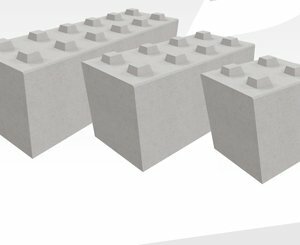
In this context of recovery, construction professionals identified the lack of visibility on potential future projects but also on potential improvements within the projects themselves (25,37%), the management of disputes and payments with customers (24,38%) and coping with rising costs while increasing productivity (23,88%) as the main challenges in the next 12 months. Additionally, the perennial proliferation of rework continues to derail the industry on the path to profitability. These issues must be addressed if companies or individuals are to meet their priorities for the coming year and thus remain competitive.
In an environment where the pressures companies face come from results rather than decision-makers, the interest of the digital transition for players in the construction world becomes clear. Construction technology and data not only play a vital role in how we build today, but also in how we protect our industry against future and unexpected challenges to productivity and profitability. Today, nearly 2 in 5 companies (38%) plan to introduce construction management platforms into their businesses in the next 12 months.
The advantages of technology
The industry is aware of the benefits of technology as an alternative to paper-based processes, but a heavy reliance on it remains. Indeed, many (around 40%) still manage their processes (such as estimating and pricing, quality checks, design management, safety, cost control and much more) on paper or messaging platforms like WhatsApp. However, many French companies (54%) have started their digital transition and see the benefits of collecting, integrating and standardizing data more efficiently, improving the decision-making process, boosting productivity and reducing costs by nearly 24%.
Construction management platforms are among those essential technologies to support the sector in the next stage of its development because they promote collaboration and communication and can create the ideal environment for future planning. By using historical data to provide an overview of previous projects, construction management platforms give companies a point of reference from which new projects can be built. This not only protects profits and productivity, but also limits mistakes that lead to rework or wasted materials.
It is true that construction is a complex sector. But today, technology and the rise of good data practices are increasingly at the root of its resilience. The days when construction companies were reactive are over. They must now take the lead. Because if they do, they will not only be able to meet the challenges that stand in their way, but also forge a competitive advantage that will serve them for years to come.
Innovate for the future
We cannot think about the future without taking climate change into account. 80% of construction professionals recognize this and say that decarbonization will be a major challenge over the next three years. While a small number of French construction companies actively manage and track their carbon emissions to date, more and more will do so in the months and years to come to be able to meet new standards, such as the ISO standard. 14001 related to the environmental management system. The younger generations of workers, particularly Generation Z, are also very aware of the issue of sustainable development and social responsibility, and the reduction of CO2 emissions is one of the major objectives of decision-makers.
In addition to the benefits of construction management platforms for pre-project and waste reduction, they are also beneficial for sustainable development. They enable investment in the capture, integration and standardization of enterprise-wide data and help companies achieve their sustainability goals. Consistency is key to meeting any challenge, especially when it comes to reducing waste.
In the face of persistent headwinds in the construction industry globally, decision makers in France continue to show resilience and adaptability to strategize for long-term success. Accelerating digital transformation and unlocking the value of data to improve decision-making, visibility, security, customer experience, as well as sustainability, will not only improve efficiency and results in the industry today , but also to increase its ability to navigate unforeseen challenges and expectations tomorrow.
Tribune by Irmak Akun, Product Marketing Manager at Procore France (LinkedIn).
 Elevating your brand: a sustainable marketing strategy in the era of generative AI
Elevating your brand: a sustainable marketing strategy in the era of generative AI
 Digital twins to modernize the cities of tomorrow
Digital twins to modernize the cities of tomorrow
 Reinventing housing in France: the challenges of global expansion in a changing market
Reinventing housing in France: the challenges of global expansion in a changing market
 Guillaume Kasbarian, Minister for Housing: a pragmatic profile that will effectively respond to the challenges of citizens and professionals
Guillaume Kasbarian, Minister for Housing: a pragmatic profile that will effectively respond to the challenges of citizens and professionals
 Old property prices are still falling but a recovery is taking shape
Old property prices are still falling but a recovery is taking shape
 A report on anticipating the effects of +4°C warming reaffirms the need for housing adaptation
A report on anticipating the effects of +4°C warming reaffirms the need for housing adaptation
 AI is already revolutionizing businesses in architecture, engineering, construction... according to Autodesk's "State of Design & Make" study
AI is already revolutionizing businesses in architecture, engineering, construction... according to Autodesk's "State of Design & Make" study
 The average rate of real estate loans starts to fall again in the 1st quarter, according to Crédit Logement
The average rate of real estate loans starts to fall again in the 1st quarter, according to Crédit Logement














